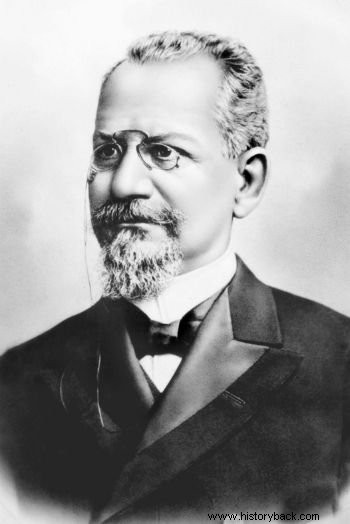Rodrigues Alves was a Brazilian politician, 5th President of the Republic of Brazil (3rd civil president), who ruled the country from 1902 to 1906, in the period called “Old Republic” (1889-1930) after the mandate of Campos Sales. A farmer from São Paulo, Alves represented an important figure, supported by the coffee oligarchies.
 Rodrigues Alves was the 5th president of Brazil
Rodrigues Alves was the 5th president of Brazil
Biography
Francisco de Paula Rodrigues Alves was born in Guaratinguetá, in the interior of São Paulo, on July 7, 1848. Son of Portuguese farmers, Domingos Rodrigues Alves and Isabel Perpétua Marins, Alves showed his skills from an early age, being the first in his class. He studied in Guaratinguetá and, in 1859, enters Colégio Pedro II, in Rio de Janeiro.
He graduated in Law from the Faculty of Law of São Paulo. He was a promoter of justice and peace, judge and councilor in Guaratinguetá, in his hometown, where he returns after completing his course. In 1875, he married Ana Guilhermina de Oliveira Borges, his cousin, with whom he had 8 children. He held several political positions, governing the country from 1902 to 1906. He died in Rio de Janeiro on January 16, 1919.
Government of Rodrigues Alves
Rodrigues Alves had a notorious political trajectory, where he held the positions of:Deputy Provincial; twice elected President of the Province of São Paulo, Constituent Deputy, Minister of Finance in the government of Floriano Peixoto (1891 and 1892) and in the government of Prudente de Morais (1895 and 1896).
Supported by the republican parties of São Paulo and Minas Gerais, he reached the highest political office, the presidency of the country, in the direct elections of 1902, taking office on November 15, 1902.
His government was marked by ideals of reurbanization, modernization and basic sanitation, especially in Rio de Janeiro, at the time the capital of the Republic, which had irregular constructions, accumulation of garbage and proliferation of various diseases, among which yellow fever, bubonic plague and smallpox.
In such a way, he invested in the construction of ports, railways, avenues. It is important to highlight that for the realization of his project of reurbanization and modernization of the capital, he expelled the poor population from their shacks and tenements, to carry out the construction of roads and public works.
This process triggered the development of favelas (favelization process), the largest in Latin America being the Rocinha favela, located in Rio de Janeiro.
Among the external issues, he participated in the annexation of the territory of Acre (formerly belonging to Bolivia), a region that prospered with the extraction and export of rubber in the Amazon, a period that became known as the “Rubber Cycle”. Thus, through the Treaty of Petrópolis (1903), between Bolivia and Brazil, it was established that the territory, from that date, would belong to Brazil.
In 1918, he was elected again President of the Republic , however, he cannot assume the position, since he was stricken by the Spanish flu.
To know more:
Floriano Peixoto;
Prudente de Moraes.
Vaccine Revolt (1904)
Rodrigues Alves carried out reforms in the city of Rio de Janeiro, since the capital had been suffering from the problem of “urban swelling” resulting from the migrations that were increasingly arriving from Europe and, above all, the reflection of the Abolition of Slavery (1889) whose , former slaves lived in precarious conditions, without sanitation, in huts crammed into cities.
In view of this, when observing the city of Rio de Janeiro, which was being attacked by epidemics, proliferation of insects and rats, due to the lack of sanitation and urban planning, Rodrigues Alves, alongside doctor Osvaldo Cruz (Director-General of Health Public), proposed in 1904, the “Mandatory Vaccination Law”.
This event became known as the “Vaccine Revolt”, which generated great dissatisfaction among the population of Rio de Janeiro, who alleged a lack of information, in addition to the authority imposed by the government. The sanitation measures were carried out by the police force, so that the population was forced to take the smallpox vaccine. Fortunately, these actions resulted in a decrease in disease.
Taubaté Agreement
In the last period of his government, the Taubaté Convention, as it became known, was an economic measure proposed by coffee growers, with the aim of balancing the price of coffee bags.
Signed by the states of São Paulo, Minas Gerais and Rio de Janeiro, in 1906, in the city of Taubaté, the agreement established the bases for the coffee valorization policy, so that the federal government would buy the surplus of coffee production for the purpose of to appreciate the price on the world market.
Although it was proposed in the government of Rodrigues Alves, it only had an effect in the government of his successor, Afonso Pena, since the president was afraid of harming the country's finances, and claimed to contain spending.
To learn more, read the articles:
old republic,
Sales Fields
